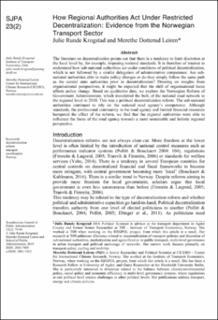How Regional Authorities Act Under Restricted Decentralization: Evidence from the Norwegian Transport Sector
Journal article, Peer reviewed
Published version
Permanent lenke
https://hdl.handle.net/11250/2759325Utgivelsesdato
2019Metadata
Vis full innførselSamlinger
- Journal articles [478]
Originalversjon
Scandinavian journal of public administration. 2019, 23 (2), 79-96.Sammendrag
The literature on decentralization points out that there is a tendency to limit discretion at
the local level by, for example, imposing national standards. It is therefore of interest to
understand how sub-national authorities act under conditions of political decentralization,
which is not followed by a similar delegation of administrative competence. Are sub national authorities able to make policy changes or do they simply follow the same path
as the central state authorities prior to decentralization? Drawing on insights from
organisational perspectives, it might be expected that the shift of organisational locus
affects policy change. Based on qualitative data, we explore the Norwegian Reform of
Government Administration, which transferred the bulk of the national road network to
the regional level in 2010. This was a political decentralization reform. The sub-national
authorities continued to rely on the national road agency’s competence. Although
standards, the professional community in the road agency and limited financial resources
hampered the effect of the reform, we find that the regional authorities were able to
influence the focus of the road agency towards a more sustainable and holistic regional
perspective.

